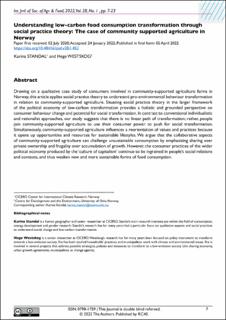Understanding low-carbon food consumption transformation through social practice theory: The case of community supported agriculture in Norway
Journal article, Peer reviewed
Published version

Åpne
Permanent lenke
https://hdl.handle.net/11250/2997942Utgivelsesdato
2022Metadata
Vis full innførselSamlinger
- Journal articles [478]
Originalversjon
International Journal of Sociology of Agriculture and Food. 2022, 28 (1), 7-23. 10.48416/ijsaf.v28i1.452Sammendrag
Drawing on a qualitative case study of consumers involved in community-supported agriculture farms in Norway, this article applies social practice theory to understand pro-environmental behaviour transformation in relation to community-supported agriculture. Situating social practice theory in the larger framework of the political economy of low-carbon transformation provides a holistic and grounded perspective on consumer behaviour change and potential for social transformation. In contrast to conventional individualistic and rationalist approaches, our study suggests that there is no linear path of transformation; rather, people join community-supported agriculture to use their consumer power to push for social transformation. Simultaneously, community-supported agriculture influences a reorientation of values and practices because it opens up opportunities and resources for sustainable lifestyles. We argue that the collaborative aspects of community-supported agriculture can challenge unsustainable consumption by emphasising sharing over private ownership and frugality over accumulation of growth. However, the consumer practices of the wider political economy produced by the ‘culture of capitalism’ continue to be ingrained in people’s social relations and contexts, and thus weaken new and more sustainable forms of food consumption. Understanding low-carbon food consumption transformation through social practice theory: The case of community supported agriculture in Norway
